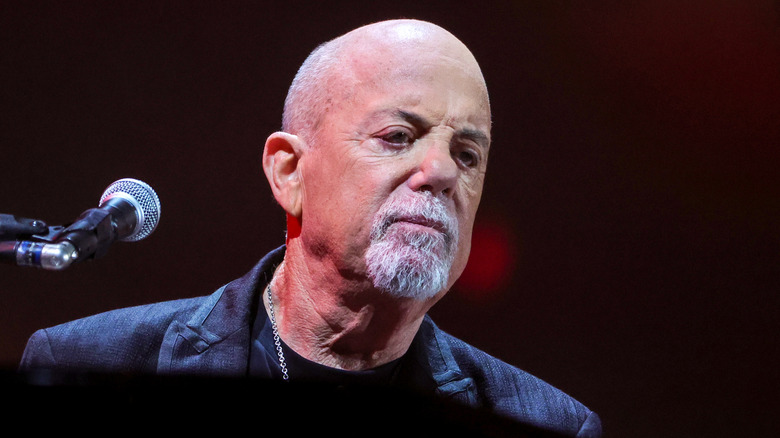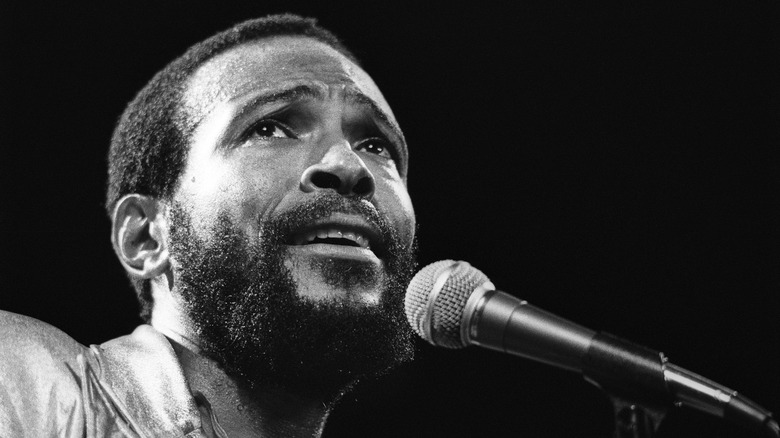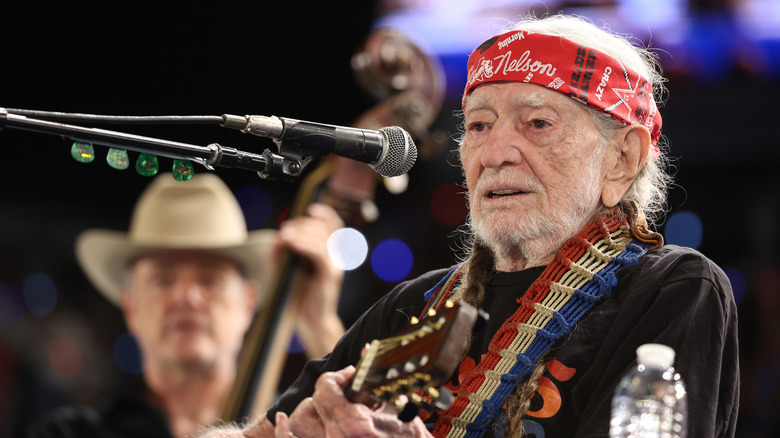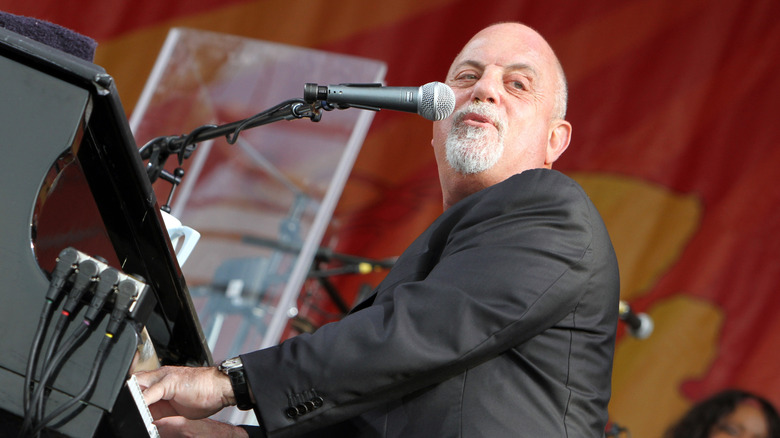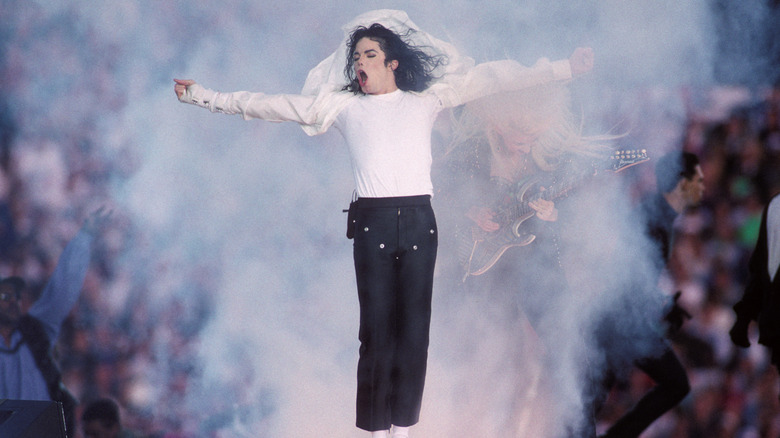These Rockstars Lost All Their Money And The Reasons Couldn't Be Clearer
The life of a musician can be exhilarating and filled with adventure. Some of the most famous rockstars on the planet jet around the world to take to the stage before huge crowds of enraptured fans. The modern era of live music is certainly complicated by the stranglehold that Ticketmaster has managed to create, but that doesn't take away from the enjoyment and visceral response that listeners take from both personal consumption and attendance at live performances alongside their fellow fans.
The modern performer exists in a unique ecosystem of overlapping interests. Taylor Swift famously went about rerecording all of her earlier material in order to reclaim ownership over the masters after a bankruptcy by her old record label ultimately saw the original recordings sold to Scooter Braun (she now owns both the originals and her remakes). Swift's net worth is reportedly $1.5 billion, entering into billionaire status partway through her massively successful "Eras" tour. Unlike Swift, plenty of singers, performers, and bandmates in even the most popular musical outfits have found themselves struggling financially. The economics of hitting the road to perform for fans isn't simple, and managing these demands alongside your own lifestyle can make good fiscal responsibility even harder. Unfortunately, plenty of rockers have found themselves in a bit of a monetary pickle. These are some of the most famous performers to have notably lost it all at one time or another.
Marvin Gaye
Marvin Gaye is an emblematic soul singer whose presence is still felt throughout the world of music to this day. His meteoric hits like "Sexual Healing" and "What's Going On" remain classics that entire rooms will break out into song with when the tunes start playing over a speaker or old school jukebox. Gaye's commercial success unfortunately came alongside plenty of personal troubles. At 44, he was shot dead by his father in the home they shared together, leaving behind a collection of intellectual property assets with no formalized means of passing them on. Marvin Gaye's financial woes didn't come about as a result of shaky inheritance questions, though. Prior to his death, Gaye's marriage to Anna Gordy Gaye fell apart, leaving him in a particularly deep financial hole. The royalties from his next album were promised to her, and this arrangement would eventually deliver roughly $600,000 to his ex-wife (on an album sarcastically titled "Here, My Dear").
A substance abuse issue and his divorce combined to saddle the "Prince of Soul" with plenty of financial uncertainty, and upon his death he was in debt to the tune of over $9 million. Moreover, roughly half of that obligation was to the IRS for back taxes owed to the government. His estate was successful in leveraging licensing agreements to both secure ownership of the songwriting rights and pay off these debts, but ran into problems down the road because of the lack of a coherent will.
Dee Snyder
Dee Snyder was the iconic frontman of Twisted Sister. He is well-known for both his classic hair metal looks and the eloquent testimony against censorship in the music industry before the Senate in 1985. Even with Twisted Sister's monumental success throughout the 1980s, he filed for bankruptcy twice in the 1990s after the genre collapsed in popularity. Snyder was unable to maintain the financial success he had enjoyed while at the top of his game the previous decade, but that didn't stop his spending habits. He told Fox News in 2012 that ego is a rockstar's worst enemy when it comes to these kinds of falls. "The ego that gets you to the top that convinces you that you'll make it, that same ego won't accept the warning signs." Instead of reevaluating his finances and budgetary needs, Snyder notes that he just kept spending and was "flat broke" by 1995.
Snyder's example is a great lesson for others. Failing to check in on your finances from time to time is one of America's most prominent wealth killers. If you don't know where you stand (or willingly ignore the warning signs of negative change), you are treading into uncertain and likely dangerous fiscal waters. Even though Snyder found himself in a deep hole, he swallowed his pride, took on a desk job in which commuting via bicycle was necessary, and worked his way back to stability for himself and his family. Although, in his case, popularity swung back around to help quite a bit as '80s nostalgia came roaring back into prominence.
Willie Nelson
Willie Nelson found himself in deep trouble with the IRS in 1990. The now-92-year-old singer has enjoyed a storied career spanning seven decades. in the 1980s, he was involved in a series of investments that were later deemed illegal by the IRS, resulting in additional tax obligations, penalties, and a titanic amount of interest. The back taxes owed by Nelson came out to nearly $17 million in total, and the IRS ultimately seized some of the singer's possessions, including his Texas ranch.
However, the creative mind that gave audiences hits like "On the Road Again," and "Mammas Don't Let Your Babies Grow Up to Be Cowboys" had a unique solution up his sleeve. He delivered an album titled "The IRS Tapes: Who Will Buy My Memories" with the intention of handing over his proceeds from the effort. The album didn't entirely meet the obligation, so the IRS began auctioning off some of his possessions. Even this ended up yielding a positive result for Nelson, though. Fans bought up his items and either sold or gave them back to the singer, helping to create something of a grassroots effort to pay off his debt. In one of the most prominent displays of this in action, recipients of support from Nelson's Farm Aid efforts banded together in an attempt to purchase his ranch and sell it back to the singer (instead, the IRS ended up selling it to his nephew, who also sought to return it). By 1993, Nelson's debt was cleared.
Tom Petty
Many rockstars found themselves in financial trouble after years of substance abuse had drained their bank accounts or a fall from the spotlight stemmed the flow of earnings. Tom Petty's run-in with the bankruptcy courts followed a decidedly different path, though. Tom Petty was famously open about his history of depression, and it's well known that the singer struggled with addiction. But before all that, Petty became perhaps the first musician to successfully navigate the bankruptcy courts in an effort to get out of a recording contract that was heavily tipped against his interests.
After releasing two commercially successful albums, Petty was on the hook to deliver a third with lopsided contractual terms in tow. He recorded the album and paid for the production on his own, then sat on the tracks, refusing to release the music and eventually dragging him into significant debt. Filing for bankruptcy in 1979, he claimed that in the previous year he'd made $36,000 (equivalent to roughly $177,500 today), while his debts totaled around half a million (nearly $2.5 million today). Eventually, his label offered new terms, paying the frontman $3 million (worth almost $15 million today) to get back to hitmaking.
Kesha
Kesha represents a sad snapshot of a much larger predatory behavior within the music industry. Contractual issues frequently come into play, especially for artists who blow up in popularity. Kesha is a great example of this kind of restriction. Signed in 2005, she committed to a six-album deal with Dr. Luke at the helm of her musical journey. Without getting into any additional details, it's easy to see why a lengthy contract of this sort wouldn't age well for the artist. However, Kesha's primary fight wasn't over contractual tension but rather a sexual assault that she alleges took place a month after the ink was dry. Kesha would eventually find herself mired in lawsuits as both plaintiff and defendant in a bitter back-and-forth with the producer. Other artists including Pink, Kelly Clarkson, and Lady Gaga have all noted that Dr. Luke is a bad apple in some form or another (although none have gone as far as to suggest some of the worst excesses that Kesha alleges).
The tit-for-tat nature of the duo's lawsuits against one another have been hard and fast. For nearly a decade (until a settlement ended the fighting in 2023) Kesha was wrapped up in legal battles and the resulting bills. The strains of this legal saga almost certainly weighed down her music career, as did her desire to end her working relationship with the man in particular and his corporate entanglements more broadly. Throughout much of this time other artists made their support known, but Taylor Swift actually donated $250,000 to her legal defense in 2016 to keep Kesha's head above water.
Toni Braxton
The seven-time Grammy award winner Toni Braxton has filed for bankruptcy twice. Even with more than 70 million total album sales to her name, a number of health complications have saddled her with more debt than she can effectively manage. In 2008, chest pains that were eventually diagnosed as microvascular angina prevented her from taking the stage to perform across a scheduled Las Vegas residency stint. Pulling out of the shows created a ripple effect of financial hardships that led to a second bankruptcy filing two years later. She's said to own assets worth as much as $10 million, but her debts range somewhere between $10 and $50 million.
Unfortunately, a decade after this filing was made, Braxton was still facing legal issues. Roughly $50,000 that was set aside to pay creditors was instead sent to her ex-husband. On top of the debts associated with her canceled residency performances, Braxton was facing a tax lien of nearly $400,000, adding significantly to her financial headaches. More than a decade earlier, Braxton followed in the footsteps of numerous other artists (starting with Tom Petty), and filed for bankruptcy protection in an effort to escape a toxic recording contract. Through much of the 1990s, Braxton's music accumulated an estimated $188 million in earnings, but the singer was only being paid about 35 cents per album sold.
Billy Joel
The "Piano Man" singer has been a legend of the recording studio and stage over a six-decade career. His early hit "Captain Jack" helped rid Joel of a long term recording contract in a shift over to working with Columbia Records, and from there the commercially successful releases seemingly just continued to pour out of his crooning voice and dancing fingertips.
But not everything was peachy for the singer. In 1973 he married his first wife, Elizabeth Weber, who came to manage Joel's career and frequently sought to exert control over his public persona and work her way into production credits and other financially motivated positions within his body of work. After their divorce, Weber's brother stayed on as Joel's manager and ultimately stole $30 million from the performer over the years. He filed for bankruptcy to prevent Joel from reclaiming what was rightfully his. His second marriage to the supermodel Christie Brinkley is thought to have soured as a result of Joel's need to constantly tour in an effort to regain the financial stability lost after this long-running theft.
MC Hammer
MC Hammer was the first hip hop artist to put out a diamond-certified album with his 10-million-plus copies sold of 1990's "Please Hammer, Don't Hurt 'Em." This helped MC Hammer build a fortune worth an estimated $70 million at the peak of his powers on the stage. However, as is the case with many music careers, massive paydays come and go, but the financial habits that underpin a lifestyle often remain. MC Hammer employed more than 200 of his friends and family members in often opaque roles, and his $12 million Fremont home reportedly cost $500,000 every year to maintain. The star also was well-known as a lavish shopper who splurged on clothing, jewelry, and cars (as well as private jets and other extravagant purchases).
Simply put, the pace at which MC Hammer spent his fortune was unsustainable, and perhaps wouldn't have been manageable even if the fickle nature of the music industry wasn't a shifting bundle of interests. MC Hammer spent like the money was never going to run out, a problem that can afflict just about anyone, unfortunately. Instead of building a responsible budget and sticking to a sensible spending plan, the artist blew his money on whatever suited his fancy at the time. From an early '90s peak in which he was earning roughly $30 million annually, he would file for bankruptcy, claiming debt obligations to the tune of $13 million in 1996.
Mick Fleetwood
Fleetwood Mac is a juggernaut of nostalgic musical performances. The rock outfit released so many memorable tracks that still get people moving to this day. But the band was equally well-known for its off stage party antics. The mythic pace at which Mick Fleetwood and his bandmates consumed cocaine genuinely rivals the stage presence the band brought to the table.
Fleetwood's personal habit certainly didn't help his financial standing. But the drummer notes that the voracious pace at which he purchased real estate was the real death knell to his long-term fiscal stability (essentially making him a form of "house poor"). Fleetwood was a founding member of the group back in the 1960s, but his net worth is dwarfed by that of some other famous contributors to the band. Fleetwood filed for bankruptcy in 1984 for the first time while the band was on a hiatus. His debts had built up to over $3.5 million at the time, and his Malibu home was sold to satisfy the court proceedings. Since then, Fleetwood has continuously found himself in hot water financially, filing bankruptcy so many times that he has lost count. One of his more costly real estate purchases was a 1,000-acre farm in Australia that cost $3 million. He purchased it with the intention of living on the compound with friends and family but spent about three weeks in total at the estate.
Michael Jackson
Perhaps the most impressively debt-ridden musical superstar of them all, Michael Jackson was over $500 million in the hole at the time of his death. The "King of Pop" was spending to the tune of $30 million per year leading up to his death, and dished out a huge sum on purchases like jewelry and furniture. He was also a consistent charitable giver, and this also contributed to the immense spending habits that underpinned his lifestyle. After his death, it also came to light that he had leveraged his song catalog as a means of securing more than $250 million in loans from Bank of America, and his estate was liable for around $40 million in costs to the tour promoter that was organizing the "This Is It" tour slated to begin shortly after his passing.
In addition to his consumer spending habits, maintaining the Neverland Ranch (a property that was listed for sale in 2015 for $100 million and sold in 2020 for $22 million to Jackson's friend Ron Burkle) couldn't have come cheap. He reportedly purchased the property in 1988 for $17 million and spend over $35 million renovating the landscape afterward. The resulting zoo, theme park, and more certainly accounted for a considerable amount of the pop star's ongoing financial obligations while he was still alive.
